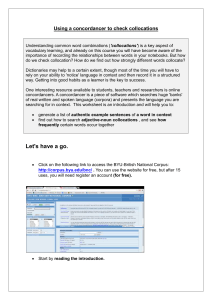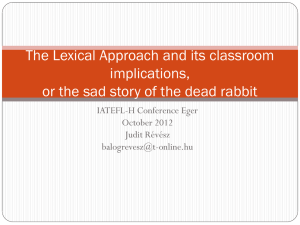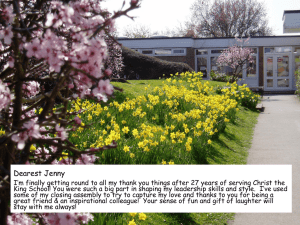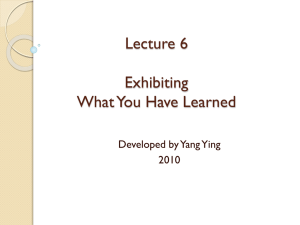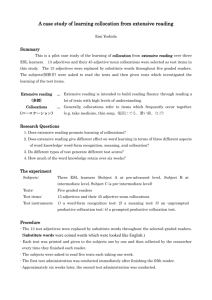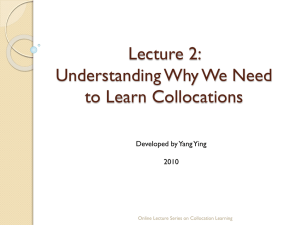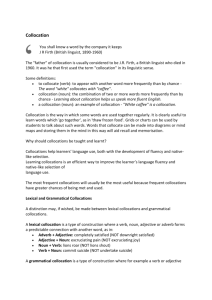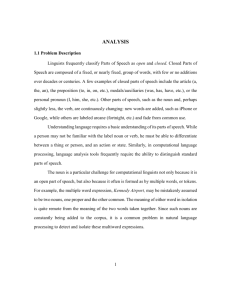collocation and translation - Università degli Studi di Roma Tor
advertisement
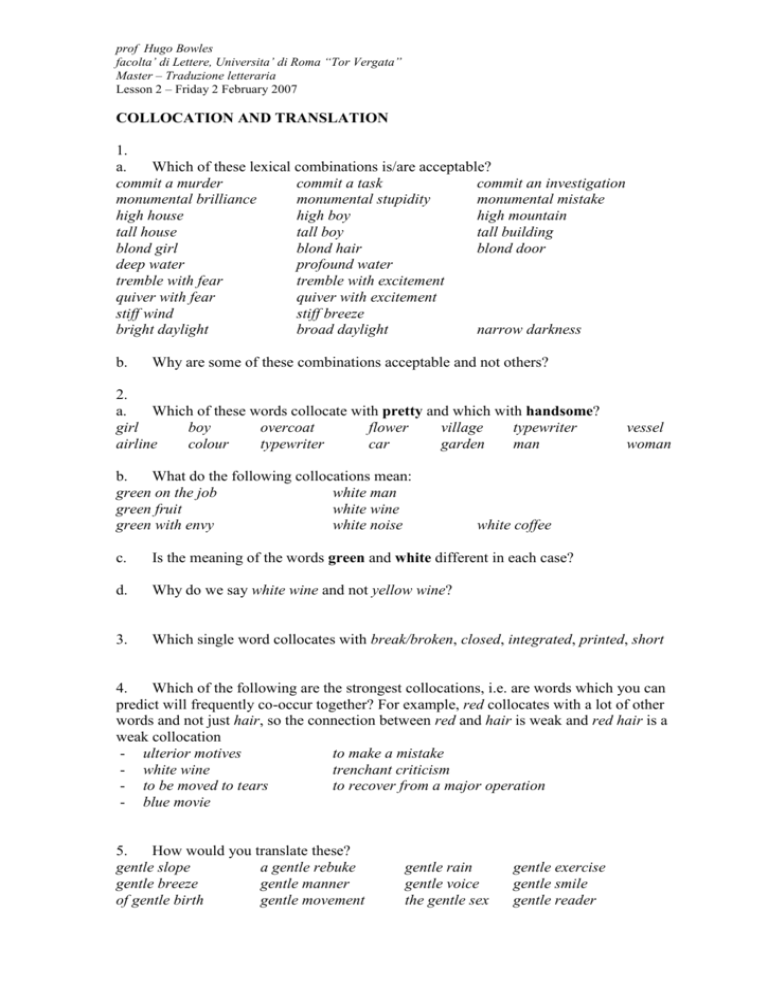
prof Hugo Bowles facolta’ di Lettere, Universita’ di Roma “Tor Vergata” Master – Traduzione letteraria Lesson 2 – Friday 2 February 2007 COLLOCATION AND TRANSLATION 1. a. Which of these lexical combinations is/are acceptable? commit a murder commit a task commit an investigation monumental brilliance monumental stupidity monumental mistake high house high boy high mountain tall house tall boy tall building blond girl blond hair blond door deep water profound water tremble with fear tremble with excitement quiver with fear quiver with excitement stiff wind stiff breeze bright daylight broad daylight narrow darkness b. Why are some of these combinations acceptable and not others? 2. a. Which of these words collocate with pretty and which with handsome? girl boy overcoat flower village typewriter airline colour typewriter car garden man b. What do the following collocations mean: green on the job white man green fruit white wine green with envy white noise vessel woman white coffee c. Is the meaning of the words green and white different in each case? d. Why do we say white wine and not yellow wine? 3. Which single word collocates with break/broken, closed, integrated, printed, short 4. Which of the following are the strongest collocations, i.e. are words which you can predict will frequently co-occur together? For example, red collocates with a lot of other words and not just hair, so the connection between red and hair is weak and red hair is a weak collocation - ulterior motives to make a mistake - white wine trenchant criticism - to be moved to tears to recover from a major operation - blue movie 5. How would you translate these? gentle slope a gentle rebuke gentle breeze gentle manner of gentle birth gentle movement gentle rain gentle voice the gentle sex gentle exercise gentle smile gentle reader 6. a. In what way is the idea of collocation useful for a literary translator? Look at these two examples. Can you explain the collocation problem? Herman J. Mankiewicz had been a fine screen writer …, a compulsive gambler, a famous drunk, a slashing wit, and a man who was almost ferociously accident prone … (Shirley Maclaine, You can get there from here, 1975: 66-7) I first met Hugh Fraser in 1977. Charming, rather hesitant, a heavy smoker and heavy gambler, he had made such headway through his fortune that he had decided to sell his last major asset. (Lonrho, A hero from zero) b. Where is the marked collocation in this text? Some tout at the book fair wanted me to take UK rights in a book on glasnost and the crisis of peace. Essays by past and present hawks, reappraisals of strategy. Could real peace break out after all? (John le Carrè, The Russia House, 1989) c. Other examples of marked collocations: it’s just not cricket which becomes it’s just not ice-hockey he’s a heavy smoker which becomes he’s a heavy non-smoker Problems that translators have with collocation (see Baker, 54-63) - temptation to follow the English collocation literally (dry cow – mucca secca) - misinterpreting the meaning of the collocation (dry cow???) - tension between accuracy and naturalness - culture-specific collocations (Union Jack) - understanding marked collocations in the source text (he’s a heavy non-smoker) - translating marked collocations (è un non fumatore …? 7. a. Fill in the space: last but not …. spick and …….. to be caught red-………… kick the ……….. b. Translate the following: how do you do? I’m under the weather to wear your heart on your sleeve red herring throw caution to the winds storm in a teacup food for thought the power that be like a bat out of hell water off a duck’s back to pull someone’s leg c. There are problems translating idioms when they are truncated or manipulated in some way. This often happens in speech. Explain the translation problem with these: every cloud has a silver lining “Well, something good might come out of all this. Silver linings and all that” It was the straw that broke the camel’s back It was the last straw If you want to know the truth, Webber, you’re beginning to get on my breasts (Pinter) Before the next lesson with me (on Weds.14) please could you do the following: - Read Baker (pp.10-81); this covers everything we have done so far (plus some more) - Translate the following (for my next lesson) taking care with lexis, idioms and collocations: Situation: Harry is out of his dormitory at night; nobody can see him because he is wearing an Invisibility Cloak; he is hiding from Professor Snape Snape swept downstairs and passed Moody without another word. Filch made a chirruping noise to Mrs Norris, who stared blankly at Harry for a few more seconds before turning and following her master. Still breathing very fast, Harry heard Snape walking away down the corridor; Filch handed Moody the egg, and disappeared from view too, muttering to Mrs Norris, ‘Never mind, my sweet … we’ll see Dumbledore in the morning … tell him what Peeves was up to’. A door slammed. Harry was left staring down at Moody, who placed his staff on the bottom-most stair, and started to climb laboriously towards him, a dull clunk on every other step. ‘Close shave, Potter,’ he muttered. ‘Yeah … I – er … thanks,’ said Harry weakly. ‘What is this thing?’ said Moody, drawing the Marauder’s map out of his pocket and unfolding it. ‘Map of Hogwarts,’ said Harry, hoping Moody was going to pull him out of the staircase soon; his leg was really hurting him. ‘Merlin’s beard,’ Moody whispered, staring at the map, his magical eye going haywire. ‘This … this is some map, Potter!’ from Harry Potter and the Goblet of Fire, JK Rowling, p.412 Please send your translation to mea few days before the lesson: bowles@tiscali.it

